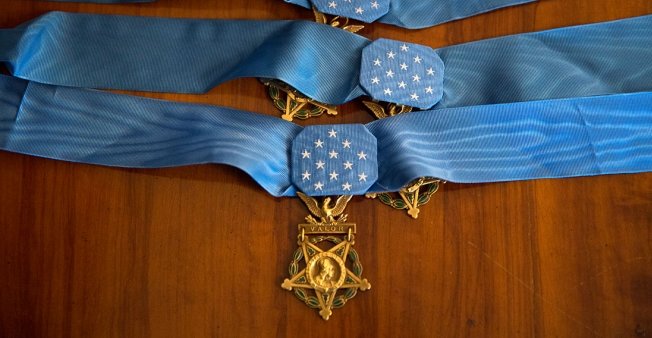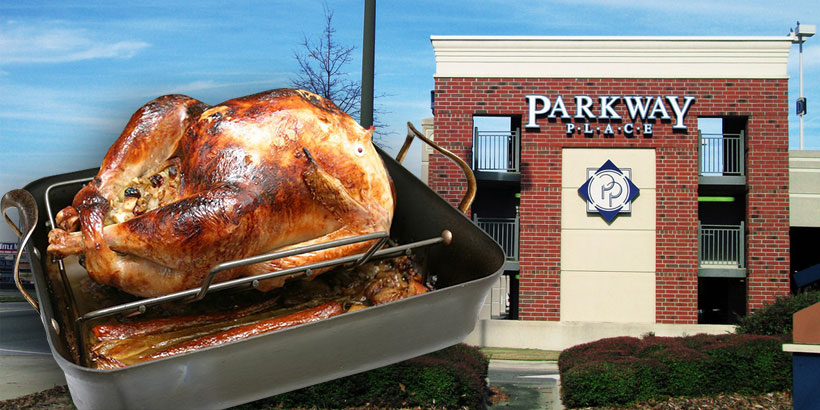(Video above: Alabama Medal of Honor recipient and patriot remembered fondly)
By John Herr
“The summer soldier and the sunshine patriot will, in this crisis, shrink from the service of his country; but he that stands it now, deserves the love and thanks of man and woman.” – Thomas Paine, The American Crisis, 1776
Betty Mize looks at a portrait of her husband behind glass. A photograph of a helicopter is displayed next to it.
“That was at his burial,” she said. “An upside-down rainbow appeared that day. A smiling rainbow.”
Mrs. Mize has come to Ola Lee Mize Patriots Park in Gadsden, one of the grandest war memorials in Alabama and maybe the country. It is named after her late husband, a Medal of Honor recipient who served in the Korean and Vietnam Wars and who died in 2014.
The memorial, near Noccalula Falls Park, honors soldiers, sailors, airmen and Marines from Etowah County who “made the supreme sacrifice” to “remind us and future generations that the price of liberty is often high.”
It also honors a man who saved many of his fellow soldiers from that fate.
Lee Mize (he didn’t like “Ola”) was born in Albertville, the son of a sharecropper. He joined the Army at age 17 after first being rejected for being underweight. He had another small problem.
“He was blind in one eye,” said Betty, laughing. “The trick of passing the eye test was, he didn’t change eyes with the paddle, he changed hands. He fooled them all of those years!”
Mize reenlisted in time for the Korean War, where he saw fierce action. His Company K was assigned to defend “Outpost Harry,” a hill between the American and Communist-held lines.
Suddenly the enemy attacked. Weaving through the heavy barrage, he rescued a wounded soldier, then established a defense from which Company K could counterattack, eventually driving the enemy from the outpost.
“During his fearless actions he was blown down by artillery and grenade blasts 3 times,” his Medal of Honor citation reads, “but each time he dauntlessly returned to his position, tenaciously fighting and successfully repelling hostile attacks.”
Told he was in line for the award, Mize refused it, saying it belonged to the whole company. Eventually the pressure became too great.
“He was threatened with a court martial,” said his good friend Rick Vaughn, past chairman of the Gadsden-Etowah Patriots Association.

At the Medal of Honor ceremony, President Dwight D. Eisenhower took Mize’s fiancée aside and told her she wouldn’t have to worry because Lee would never see overseas combat again.
“We weren’t married,” Betty recalled, “but when Eisenhower said that, I thought, OK, I can get serious about this!”
It didn’t quite work out that way. Mize would volunteer for four tours of duty with the Green Berets in Vietnam. Afterward, he taught at the Special Forces school in Fort Bragg, N.C., where he authored the survivor escape program.
Beloved by his students, Mize — predictably — declined an offer by H. Ross Perot to build a statue of him.
“He loved his family and loved his country,” said Vaughn. “He didn’t care a whole lot about acclamations for himself.”
Mize especially loved the woman he called the Admiral. Betty Jackson grew up with Lee Mize in west Gadsden. She didn’t care for the older boy at first. Then she reluctantly went on a double date with him, and changed her mind.
Together they had two daughters, four grandchildren and six great-grandchildren, one of whom recently graduated from the University of Alabama.
The Mizes loved Gadsden. And their hometown loves them right back.
“His funeral was awesome, breathtaking,” said Betty. “The funeral procession was 2 miles long. People were standing on the side of the road with flags, veterans were saluting. It was overwhelming.
“He would be so honored,” she added, “but he would be like, ‘Oh my goodness, why are they doing this?’”
After touring the memorial, Betty let her emotions show for the first time as she talked about the nation her husband fought so bravely for.
“He taught me so much about patriotism, about loving my country,” she said. “The younger people need to learn that.”















